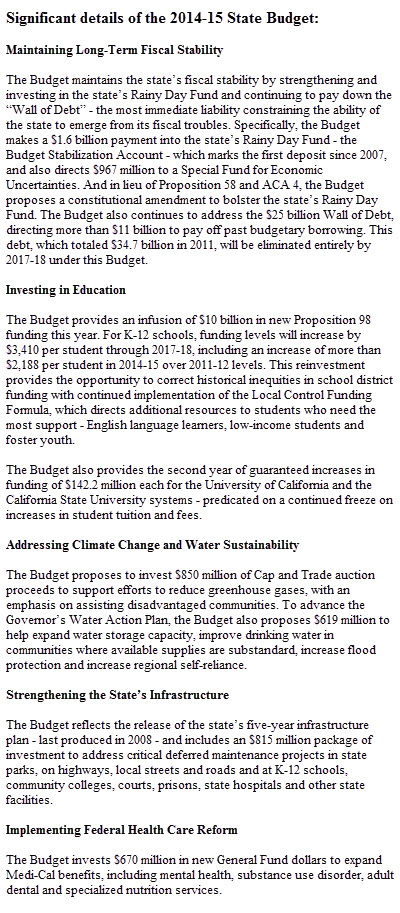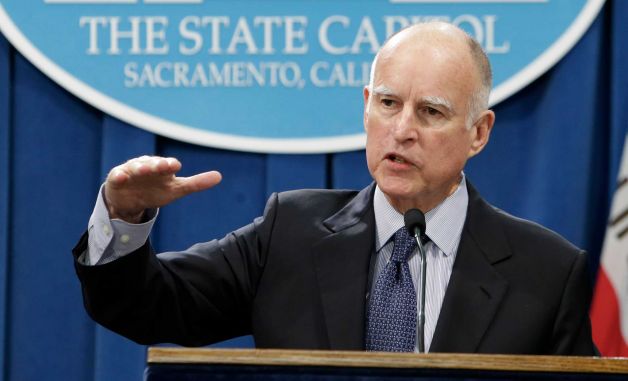On Thursday, the governor rushed out his proposed 2014-15 budget as the proposal had been prematurely leaked. According to a release from the governor’s office, Governor Jerry Brown is “vowing to keep the state on a path to long-term fiscal stability,” by proposing “a balanced budget that pays off more than $11 billion in debt and builds a lasting rainy day fund while continuing to invest in public schools and expand health care coverage for millions.”
“With a decade of intractable deficits behind us, California is poised to take advantage of the recovering economy and the tens of thousands of jobs now being created each month,” said Governor Brown. “But given the vagaries of the business cycle, we must be ever vigilant in the commitment of public funds. Wisdom and prudence should be the order of the day.”
“When Governor Brown took office, the state faced a massive $26.6 billion budget deficit and estimated annual shortfalls of roughly $20 billion. On Governor Brown’s watch, the state eliminated these deficits with billions of dollars in cuts and new temporary revenue approved by California voters,” the Governor’s office claimed.
 Reaction to the governor’s budget naturally was mixed. The California Teachers Association praised the budget, arguing it will help “California schools heal after years of devastating cuts.”
Reaction to the governor’s budget naturally was mixed. The California Teachers Association praised the budget, arguing it will help “California schools heal after years of devastating cuts.”
CTA President Dean Vogel released a statement arguing, “California teachers appreciate the governor’s continued commitment to public education and to repaying the billions of dollars that had been cut from students, schools and colleges.”
“The governor’s proposed budget will help our public schools and colleges continue to heal after years of devastating cuts. As we heal our schools, we heal our communities,” he stated. “This budget will allow local school districts to continue to restore critical programs and provide the resources that educators need to help students learn.”
“We look forward to working with the governor and the Legislature on this state budget, as well as a plan to address the CalSTRS shortfall,” Mr. Vogel added. “Making sure educators have a secure retirement is critical to attracting and keeping quality educators in the profession. The state must ensure the retirement commitments made to our hard-working teachers.”
Senator Lois Wolk called it “a budget for a recovering economy.”
“The Governor’s budget pays off more than $11 billion in debt and builds the state’s reserve while reinvesting in public schools and the courts, both of which have experienced significant budget cuts in recent years,” she said.
“This budget strengthens the safety net for the state’s neediest and most vulnerable residents with proposals including a three year pilot child-care program for low income parents seeking employment,” Senator Wolk continued.
“The Governor’s budget supports expanding local governments’ access to Infrastructure Financing Districts, which enable governments to pay for public works projects without impacting school district’s share of property tax or the state general fund,” she said. “I am pleased to see that the Governor supports this concept, which is very similar to legislation I have twice authored. I look forward to working on this budget with the Governor and my colleagues in the Legislature.”
Assemblymember Mariko Yamada applauded “the continued restraint and responsibility reflected in Governor Brown’s budget proposals.”
“Attention to our state hospitals and developmental centers, along with additional resources to strengthen protections for some of our State’s most vulnerable residents is also encouraging,” she said. However, “At the same time, the blanket prohibition of federally-authorized overtime for In Home Supportive Services (IHSS) caregivers is a ‘one-size-fits-all’ approach to a program that for four decades has respected consumer-choice and consumer direction. As Chair of the Assembly Aging and Long Term Care Committee, I look forward to contributing to the dialogue on this issue.”
Senator Leland Yee was pleased “to see more investment in California’s public schools with an increase of over $600 in per student spending and a proposed tuition freeze at UC and CSU.”
No New Money for Redevelopment
Governor Brown’s budget does throw a small bone to Senator President Pro Tem Darrell Steinberg by proposing reducing the voter approval threshold from 2/3rds for special local issues such as bonds and tax increases; the threshold would be lowered to 55% for local governments to issue bonds for public works projects, known as infrastructure financing districts (IFDs).
However, the indication is that there will be no meaningful legislation on RDA until after the election.
The governor argues, “The elimination of RDAs was necessary to avoid further reductions in core services. Given that current compliance levels with the RDA dissolution statutes is improving, the Budget proposes expanding the tax increment financing tool utilized by IFDs for a broader array of uses than that which is currently authorized under law.”
For instance, the plan would “expand the types of projects that IFDs can fund to include military base reuse, urban infill, transit priority projects, affordable housing, and associated necessary consumer services.”
“The goal is to maintain the IFD focus on projects which have tangible quality‑of‑life benefits for the residents of the IFD project area,” the governor proposed.
Moreover, it will “allow cities or counties that meet specified benchmarks to create these new IFDs, and to issue related debt, subject to receiving 55‑percent voter approval.”
It will also “allow new IFD project areas to overlap with the project areas of the former RDAs, while strictly limiting the available funding in those areas to dollars available after payment on all of the former RDAs’ approved obligations.”
Finally, it will “maintain the current IFD prohibition on the diversion of property tax revenues from K‑14 schools, which will ensure any usage will have no state General Fund impact, and require entities that seek to establish an IFD to gain the approval of the county, cities, and special districts that would contribute their revenue, including residual revenue, to the IFD.”
The governor proposes, “The expansion of the use of IFDs should not come at the expense of the continuing RDA dissolution process.”
The governor argues, “Providing these enhancements to existing IFD statutes will provide cities and counties with enhanced options, while also ensuring the impacted local agencies have a voice in whether they will contribute their revenue to those projects and, if so, how their revenues will be used. This proposal will also help ensure the new tools are available for key local priorities such as urban infill, transit‑oriented development, and the provision of affordable housing.”
The proposal does widen the amount of projects IFDs can fund and lowers the threshold, but it is far from a replacement of RDA. At best, cities may see the lowering of thresholds as a first step toward new development options.
—David M. Greenwald reporting


Education funding to increase more than $2188 per student in 2014-15.
Great, now the DJUSD can work on rescinding some of the parcel taxes.
If that number is real and holds, I would certainly hope they transition away from the non-base parcel taxes.
G.I.: “Education funding to increase more than $2188 per student in 2014-15.”
That money is not distributed evenly across the state. DJUSD consistently comes in below state average based on funding formulas.
Okay, it’s still going to be a nice infusion of funds. The whole reason for the parcel taxes were because of lost gov’t funds, or so we were told. This goes a long way in restoring those funds so it’s time to ease up on the overburdened homeowners.
A new CarMax.com location is opening in Roseville. They need about 100 new used car sales reps. They got over 5000 applications.
What the governor and the Democrats are doing?
Giving more money to the employees of an obsolete education system while continuing to rob from programs that help ensure jobs are available.
I guarantee that California will fail to improve education with this windfall.
I also guarantee that California will continue to have a REAL unemployment rate that is much higher than the national average and kids will continue to struggle to launch into a life of economic self-sufficiency.
(breaking my self-imposed exile, at least for the moment) A “guarantee” usually means that someone puts additional “skin in the game” if the projected/promised result does not occur… if you are proved incorrect Frankly, are you willing to have your taxes doubled? Unless you are responsible/have ‘control’, how can you use the term “guarantee”?
Our schools are not obsolete. They serve many students well.
My guess is that the school board will let the emergency parcel taxes expire and renew only the ones that have been around for a long time.
My guess is that the spin on the school parcel taxes will be something like this. The school board will say that they cannot let the special temporary emergency school parcel taxes go away for several years until the state has reasonably demonstrated that the increased funding levels are going to be permanent. After several years of this we will be told that the parcel taxes have to stay because they are paying for numerous wonderful and essential programs that will have been in place for several years, and which if stopped will lead to gutting of these programs and massive teacher layoffs.
You guessed it WesC. Once they get their teeth into something they never let go.
You may not be wrong. For one thing, as WDF indicated, Davis may not get the kind of funding increase that other districts will. Second, if that increase does not allow them to restore the cuts they have made over the last seven years, why would they?
I’d bet you guys are all wrong. Most of the parcel taxes will roll off.